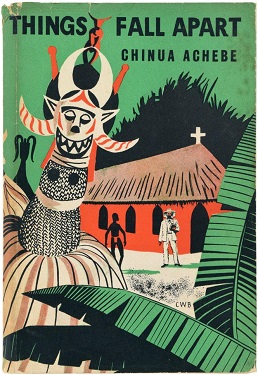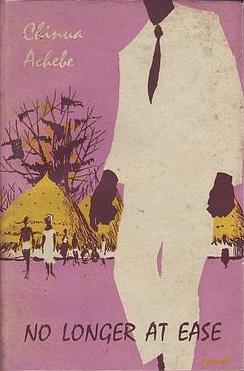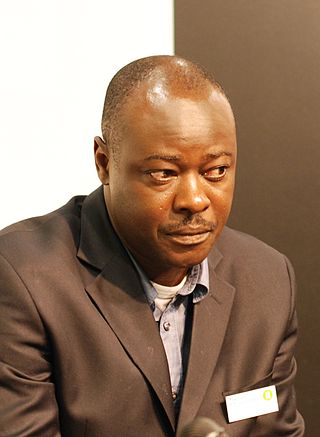
Heart of Darkness (1899) is a novella by Polish-English novelist Joseph Conrad in which the sailor Charles Marlow tells his listeners the story of his assignment as steamer captain for a Belgian company in the African interior. The novel is widely regarded as a critique of European colonial rule in Africa, whilst also examining the themes of power dynamics and morality. Although Conrad does not name the river on which most of the narrative takes place, at the time of writing the Congo Free State, the location of the large and economically important Congo River, was a private colony of Belgium's King Leopold II. Marlow is given a text by Kurtz, an ivory trader working on a trading station far up the river, who has "gone native" and is the object of Marlow's expedition.

Chinua Achebe was a Nigerian novelist, poet, and critic who is regarded as a central figure of modern African literature. His first novel and magnum opus, Things Fall Apart (1958), occupies a pivotal place in African literature and remains the most widely studied, translated, and read African novel. Along with Things Fall Apart, his No Longer at Ease (1960) and Arrow of God (1964) complete the "African Trilogy". Later novels include A Man of the People (1966) and Anthills of the Savannah (1987). In the West, Achebe is often referred to as the "father of African literature", although he vigorously rejected the characterization.

Things Fall Apart is the debut novel by Nigerian author Chinua Achebe, first published in 1958. It depicts pre-colonial life in the southeastern part of Nigeria and the invasion by Europeans during the late 19th century. It is seen as the archetypal modern African novel in English, and one of the first to receive global critical acclaim. It is a staple book in schools throughout Africa and is widely read and studied in English-speaking countries around the world. The novel was first published in the United Kingdom in 1962 by William Heinemann Ltd, and became the first work published in Heinemann's African Writers Series.
In June 1962 a conference of African literature in the English language, the first African Writers Conference, was held at Makerere University College in Kampala, Uganda. Officially called a "Conference of African Writers of English Expression", it was sponsored by the Congress for Cultural Freedom and the Mbari Club in association with the Department of Extra-Mural Studies of Makerere, whose director was Gerald Moore.

No Longer at Ease is a 1960 novel by Nigerian author Chinua Achebe. It is the story of an Igbo man, Obi Okonkwo, who leaves his village for an education in Britain and then a job in the Nigerian colonial civil service, but is conflicted between his African culture and Western lifestyle and ends up taking a bribe. The novel is the second work in what is sometimes referred to as the "African trilogy", following Things Fall Apart and preceding Arrow of God, though Arrow of God chronologically precedes it in the chronology of the trilogy. Things Fall Apart concerns the struggle of Obi Okonkwo's grandfather Okonkwo against the changes brought by the British.
The African Writers Series (AWS) is a collection of books written by African novelists, poets and politicians. Published by Heinemann, 359 books appeared in the series between 1962 and 2003.

Helon Habila Ngalabak is a Nigerian novelist and poet, whose writing has won many prizes, including the Caine Prize in 2001. He worked as a lecturer and journalist in Nigeria before moving in 2002 to England, where he was a Chevening Scholar at the University of East Anglia, and now teaches creative writing at George Mason University, Fairfax, Virginia.

A Man of the People is a novel by Nigerian writer Chinua Achebe. Written as a satirical piece, "A Man of the People" follows the story told by Odili, a young and educated narrator, about his conflict with Chief Nanga, his former teacher who enters a career in politics in an unnamed fictional 20th-century African country. Odili represents the changing younger generation, while Nanga represents the traditional West African customs inspired by Achebe's native Nigeria. The book ends with a military coup, similar to the real-life coup organized by Major Chukwuma Kaduna Nzeogwu, Major Adewale Ademoyega, Major Emmanuel Ifeajuna, Captain Chris Anuforo, Major Donatus Okafor, and Major Humphrey Chukwuka.
The Royal African Society (RAS) of the United Kingdom was founded in 1901 to promote relations between the United Kingdom and countries in Africa. The RAS is a not-for-profit membership organisation based in London. In addition to producing its journal African Affairs, formerly Journal of the African Society), the RAS runs programmes in business, politics, the arts and education. In 2012, the society launched the Africa Writes festival, presented in partnership with the British Library, and now the UK's most prominent celebration of contemporary literature from Africa and the diaspora.
Geoff Wisner is an American author, book reviewer, and editor. His articles appear in publications such as The Christian Science Monitor, Words Without Borders, Transition Magazine, Boston Globe, Wall Street Journal, and Wild Earth. He is a graduate of Harvard University (1980). He currently lives in New York City. He is married to Jennifer Marie Brissett, a writer.
There is a sizable community of people of Indian origin living in Uganda. In 2003, there were an estimated 20,000 people of Asian descent (majority of Indians and Pakistanis living in Uganda, compared to approximately 100,000 before they were expelled by the dictator Idi Amin in 1972.
Chin Ce is a Nigerian writer of poetry, fiction and essays and a graphic editor.
Henry Chakava is a Kenyan publisher. He has focused on the publication of books particularly in East Africa and has been called "the father of Kenyan publishing". For his contribution to educational and cultural literature in his region, he has received several awards.
Martin Cameron Duodu is a United Kingdom-based Ghanaian novelist, journalist, editor and broadcaster. After publishing a novel, The Gab Boys, in 1967, Duodu went on to a career as a journalist and editorialist.

James Currey is a former academic publisher specialising in African Studies which since 2008 has been an imprint of Boydell & Brewer. It is named after its founder who established the company in 1984. It publishes on a full spectrum of topics—including anthropology, archaeology, history, politics, economics, development studies, gender studies, literature, theatre, film studies, and the humanities and social sciences generally—and its authors include leading names such as Bethwell Ogot and Ngũgĩ wa Thiong'o.

Ellah Wakatama, OBE, Hon. FRSL, is the Editor-at-Large at Canongate Books, a senior Research Fellow at Manchester University, and Chair of the AKO Caine Prize for African Writing. She was the founding Publishing Director of the Indigo Press. A London-based editor and critic, she was on the judging panel of the 2017 International Dublin Literary Award and the 2015 Man Booker Prize. In 2016, she was a Visiting Professor & Global Intercultural Scholar at Goshen College, Indiana, and was the Guest Master for the 2016 Gabriel Garcia Marquez Foundation international journalism fellowship in Cartagena, Colombia. The former deputy editor of Granta magazine, she was the senior editor at Jonathan Cape, Random House and an assistant editor at Penguin. She is series editor of the Kwani? Manuscript Project and the editor of the anthologies Africa39 and Safe House: Explorations in Creative Nonfiction.
Maya Jaggi is a British writer, literary critic, editor and cultural journalist. In the words of the Open University, from which Jaggi received an honorary doctorate in 2012, she "has had a transformative influence in the last 25 years in extending the map of international writing today". Jaggi has been a contributor to a wide range of publications including The Guardian, Financial Times, The Independent, The Literary Review, The Times Literary Supplement, The New York Review of Books, The Wall Street Journal, The Economist, New Statesman, Wasafiri, Index on Censorship, and Newsweek, and is particularly known for her profiles of writers, artists, film-makers, musicians and others. She is also a broadcaster and presenter on radio and television. Jaggi is the niece of actor and food writer Madhur Jaffrey.
Nwando Achebe is a Nigerian-American academic, academic administrator, feminist scholar, and multi-award-winning historian. She is the Jack and Margaret Sweet Endowed Professor of History and the Associate Dean for Diversity, Equity, and Inclusion in the College of Social Science at Michigan State University. She is also founding editor-in-chief of the Journal of West African History.
Chinua Achebe Literary Festival is an annual literary event held in honour of Nigerian writer and literary critic — Chinua Achebe, the author of Things Fall Apart (1958), in commemoration and celebration of his works and immense contributions in the literary field.
Lyn Innes is an Australian-born British academic and author, who is Emeritus Professor of Postcolonial Literatures at the University of Kent at Canterbury. Her interest is in studies of cultural nationalism, with her work focusing on Irish, African, African-American and Caribbean literatures, in which field she has been a scholar of note for more than five decades. As a great-granddaughter of the last Nawab of Bengal, Mansur Ali Khan, Innes is the author of a family memoir entitled The Last Prince of Bengal: A Family's Journey from an Indian Palace to the Australian Outback (2021).







